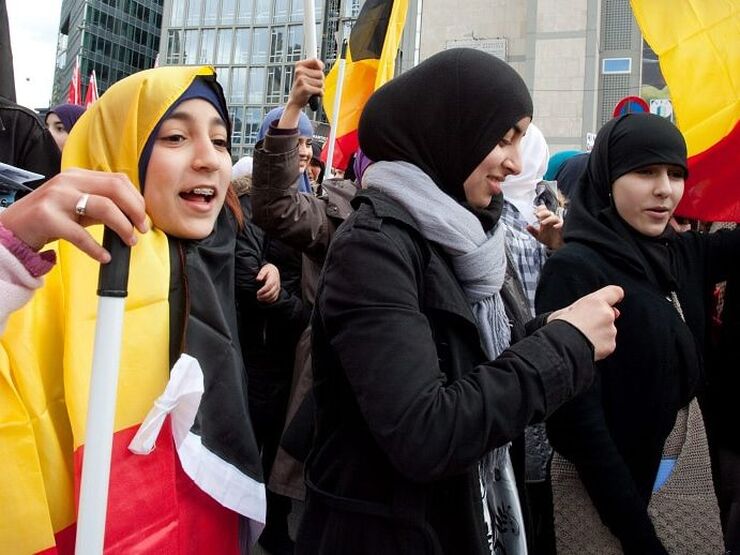|
|
|
In 2018, the research department of Awel, a Flemish civil society organization, published a report on the impact of the late terrorist attacks in Europe on the identity formation of minority youth. The report, based on testimonials, revealed that some Muslim children try to hide their ethno-religious background out of fear of being verbally attacked. Some even wish to ‘unbecome’ Moroccan or Muslim to respond to Islamophobia.
The largest ethnic minority group in Belgium originates from Morocco. This primarily Muslim group is indeed strongly stigmatized, even more so since 9/11. It is argued that terrorist attacks increase Islamophobic or anti-Muslim sentiments, which hence also impacts the well-being of Muslim children living in Flanders. The findings of the research report nevertheless did not receive as much public and political attention as deserved. Yet, ethnic minority citizens’ identity formation has long been a subject of political interest, especially since many politicians across the spectrum propose that minorities, and particularly Muslims, do not identify as Belgian.
This supposed problem of ‘weak identification’ among minority youth with Belgian identity has also gained the attention of scholars. Over the past number of years, scholars have extensively studied how minority youth identify, whether they identify as ‘Belgian’, and how the alleged problem of ‘weak Belgian identity’ among these youth can be explained. Flemish politicians, but also educators, seem strongly concerned with minorities’ identifications; why then, did the aforementioned report receive so little public and political attention?
There are several answers to this question, but two of them deserve specific attention. First, the finding that some minority children would anxiously hide their ethno-religious background is simply not problematized because the mainstream idea among many governing politicians is that minority ethnic youth should not even identify with those minority ethnic backgrounds in the first place. In the Flemish context, ethnic minority children are generally not only expected to identify with the national identity of their country of residence, but any identification with their or their (grand)parents’ country of descent is framed by many politicians as an illustration of their so-called lack of loyalty to Belgium. Second, there is seemingly an unwillingness among these policy makers to recognize that social exclusion of minorities affects their identifications. Since the causes of young people’s so-called lack of national identification, for example, are mainly sought in an alleged communal upbringing by migrant parents, reports dealing with the impact of stigma on young people’s identity formation are not at the top of the political agenda. In my Identities article, ‘On the shifting (ir)relevance of national and ethnic identifications in urban children’s everyday lives’, I discuss how the relationship between children’s identifications and sense of belonging is highly complex. The results of my study show that many minority children actually do identify as Belgian, but some other minority children indeed also consciously distance themselves from a Belgian identity because they feel that society will never accept them as Belgian anyway. These children, for instance, say that they do not identify as Belgian ‘because they will never see us as Belgian’. Yet, the reverse is also true: other children then identify themselves as Belgian precisely because they feel stigmatized. For them, identifying as Belgian is a claim for recognition rather than a natural identification. One of the respondents, for instance, explains that she identifies as Belgian so that the majority group is not able to say to her that she should go back to her country of descent. What the article thus shows is that contrary to simplistic political and mainstream conceptions of how minority youth should identify as Belgian, national identifications in itself say very little about loyalty or feelings of belonging. Some children do not identify as Belgian yet indicate that they feel very attached to the country and their local environment. On the other hand, some who strongly identify as Belgian feel most excluded. Using the strength of national identification to gauge one’s senses of belonging to a country indeed rarely provides convincing results. In the context of this study, ethnic minority children generally indicate that they feel at place. However, they are very aware of the political climate in which they live, which also makes them deal strategically with their identities. Rather than focusing on their family socialization to understand their identifications, we must shift our political attention to the hostile societal environment minority children have to develop their identities in.
Blog post by Imane Kostet, University of Antwerp, Belgium
Read the Identities article:
Kostet, Imane. On the shifting (ir)relevance of national and ethnic identifications in urban children’s everyday lives. Identities: Global Studies in Culture and Power. DOI: 10.1080/1070289X.2022.2042952
Read further in Identities:
Constructions of self-identification: children of immigrants in Sweden Landing in a rural village: home and belonging from the perspectives of unaccompanied young refugees Haitian, Bahamian, both or neither? Negotiations of ethnic identity among second-generation Haitians in the Bahamas
0 Comments
Your comment will be posted after it is approved.
Leave a Reply. |
|
Explore Identities at tandfonline.com/GIDE |
|
The views and opinions expressed on The Identities Blog are solely those of the original blog post authors, and not of the journal, Taylor & Francis Group or the University of Glasgow.


